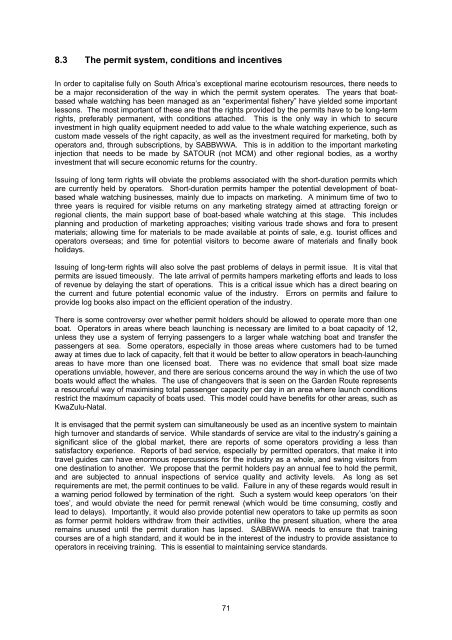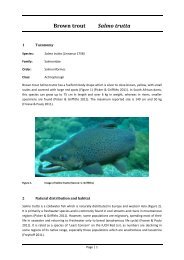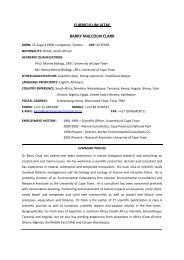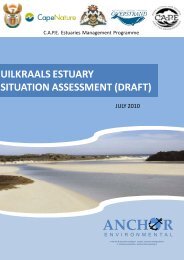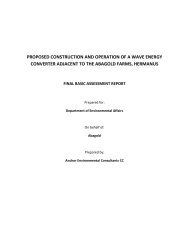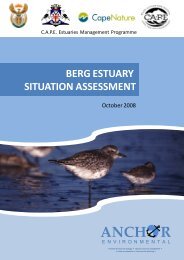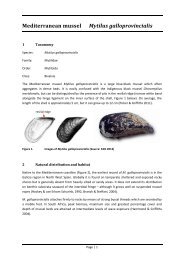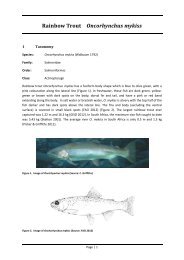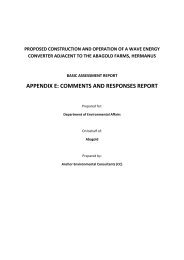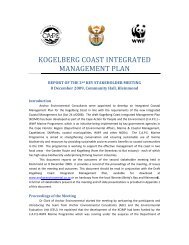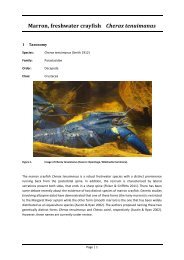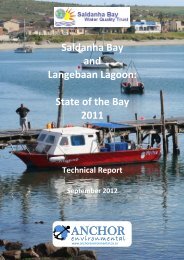Download PDF (2.5MB) - Anchor Environmental
Download PDF (2.5MB) - Anchor Environmental
Download PDF (2.5MB) - Anchor Environmental
Create successful ePaper yourself
Turn your PDF publications into a flip-book with our unique Google optimized e-Paper software.
8.3 The permit system, conditions and incentives<br />
In order to capitalise fully on South Africa’s exceptional marine ecotourism resources, there needs to<br />
be a major reconsideration of the way in which the permit system operates. The years that boatbased<br />
whale watching has been managed as an “experimental fishery” have yielded some important<br />
lessons. The most important of these are that the rights provided by the permits have to be long-term<br />
rights, preferably permanent, with conditions attached. This is the only way in which to secure<br />
investment in high quality equipment needed to add value to the whale watching experience, such as<br />
custom made vessels of the right capacity, as well as the investment required for marketing, both by<br />
operators and, through subscriptions, by SABBWWA. This is in addition to the important marketing<br />
injection that needs to be made by SATOUR (not MCM) and other regional bodies, as a worthy<br />
investment that will secure economic returns for the country.<br />
Issuing of long term rights will obviate the problems associated with the short-duration permits which<br />
are currently held by operators. Short-duration permits hamper the potential development of boatbased<br />
whale watching businesses, mainly due to impacts on marketing. A minimum time of two to<br />
three years is required for visible returns on any marketing strategy aimed at attracting foreign or<br />
regional clients, the main support base of boat-based whale watching at this stage. This includes<br />
planning and production of marketing approaches; visiting various trade shows and fora to present<br />
materials; allowing time for materials to be made available at points of sale, e.g. tourist offices and<br />
operators overseas; and time for potential visitors to become aware of materials and finally book<br />
holidays.<br />
Issuing of long-term rights will also solve the past problems of delays in permit issue. It is vital that<br />
permits are issued timeously. The late arrival of permits hampers marketing efforts and leads to loss<br />
of revenue by delaying the start of operations. This is a critical issue which has a direct bearing on<br />
the current and future potential economic value of the industry. Errors on permits and failure to<br />
provide log books also impact on the efficient operation of the industry.<br />
There is some controversy over whether permit holders should be allowed to operate more than one<br />
boat. Operators in areas where beach launching is necessary are limited to a boat capacity of 12,<br />
unless they use a system of ferrying passengers to a larger whale watching boat and transfer the<br />
passengers at sea. Some operators, especially in those areas where customers had to be turned<br />
away at times due to lack of capacity, felt that it would be better to allow operators in beach-launching<br />
areas to have more than one licensed boat. There was no evidence that small boat size made<br />
operations unviable, however, and there are serious concerns around the way in which the use of two<br />
boats would affect the whales. The use of changeovers that is seen on the Garden Route represents<br />
a resourceful way of maximising total passenger capacity per day in an area where launch conditions<br />
restrict the maximum capacity of boats used. This model could have benefits for other areas, such as<br />
KwaZulu-Natal.<br />
It is envisaged that the permit system can simultaneously be used as an incentive system to maintain<br />
high turnover and standards of service. While standards of service are vital to the industry’s gaining a<br />
significant slice of the global market, there are reports of some operators providing a less than<br />
satisfactory experience. Reports of bad service, especially by permitted operators, that make it into<br />
travel guides can have enormous repercussions for the industry as a whole, and swing visitors from<br />
one destination to another. We propose that the permit holders pay an annual fee to hold the permit,<br />
and are subjected to annual inspections of service quality and activity levels. As long as set<br />
requirements are met, the permit continues to be valid. Failure in any of these regards would result in<br />
a warning period followed by termination of the right. Such a system would keep operators ‘on their<br />
toes’, and would obviate the need for permit renewal (which would be time consuming, costly and<br />
lead to delays). Importantly, it would also provide potential new operators to take up permits as soon<br />
as former permit holders withdraw from their activities, unlike the present situation, where the area<br />
remains unused until the permit duration has lapsed. SABBWWA needs to ensure that training<br />
courses are of a high standard, and it would be in the interest of the industry to provide assistance to<br />
operators in receiving training. This is essential to maintaining service standards.<br />
71


